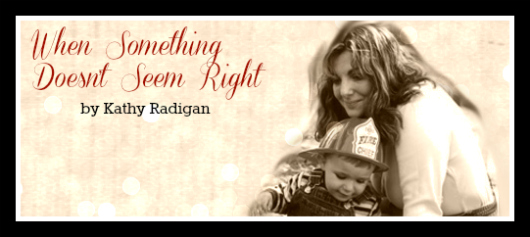When Something Doesn’t Seem Right by Kathy Radigan of Bonbon Break

When Something Doesn’t Seem Right
~:: Kathy Radigan of Bonbon Break ::~
![]() If you have ever looked at your beautiful child and felt in the pit of your stomach that something might be wrong, this post is for you.
If you have ever looked at your beautiful child and felt in the pit of your stomach that something might be wrong, this post is for you.
I still can remember the morning, eleven years ago, when I knew in my soul something wasn’t right with our daughter, Elizabeth. She was six weeks old, and very sweet. I was admiring her and enjoying a few lazy moments of cuddling with her.
I am not sure what it was specifically that made me notice it that day, but as I was looking and cooing at Elizabeth, it struck me that she was not looking back at me.
That was it, nothing really dramatic. But in the deepest part of my soul, I knew something was not right with our daughter.
That morning began what has been a very long, often painful, and extremely frustrating journey at attempting to uncover the mysteries of Elizabeth and to determine what we could do to best help her.

Elizabeth has had 5 MRIs, starting at age two. Each one shows something is very wrong with her brain, but not one doctor can tell us exactly what. The parade of professionals we have seen include two geneticists, two neurologists, an otolaryngologist, an audiologist, an endocrinologist, allergists, immunologists, and even one alternative healing doctor. Not to mention an extremely long line of special education teachers, speech therapists, occupational therapists, and physical therapists since she was 18 months old.
Eleven years later, we still do not have a name for the disorder that wrecks so much havoc on our daughter, but I have learned some invaluable lessons that I want to share with anyone who may look at their child one day and wonder if something is wrong.
1. First thing to remember is breathe. You may experience a gut-wrenching feeling that something is wrong, much like I did with my daughter, or it just may be a faint feeling that something does not seem right. Whatever the nature of your reaction, chances are you are going to be nervous. Breathing is a good way to settle down. The calmer you can remain the better for you and your child.
2. Trust your instinct. It has been my experience that if something feels wrong, it probably is. That does not mean your worst nightmare will come true, but you are going to want to act on your feeling. Do not let anyone, no matter how important or well-intentioned, convince you to ignore your instinct. You know your child best.
3. Do not panic. That may seem impossible. I certainly had my moments when the fear was intense. It is frightening when you know something is just not adding up. But panic does not solve anything, and it can leave you paralyzed with fear.
4. Research is great, but be very careful, especially in the beginning. I went right to my well worn copy of “What to Expect the First Year” and checked under what my baby should be doing at six weeks. Stick with a small number of mainstream information sources, such as web sites or news publications you trust or a well-respected child development book. Among the sea of great information that is out there for parents there is also a lot of misinformation. You need professional guidance and facts so you can best help your child.
5. Act on your feeling ASAP. The sooner you respond to a perceived problem, the quicker you can get your child help. Call your pediatrician or health care provider and make an appointment. Let them know your concerns and get their opinion. If they agree with you, they may recommend a specialist. Or they might suggest waiting a few weeks to see if a developmental milestone is reached. Ask yourself this question: do they take my concerns seriously? It is paramount that your health care professionals respect your concerns and opinions.
6. Doctors, specialists, and teachers are only human beings. They can be wrong. Trust your gut instinct no matter who the professional is or how well-renowned they may be. You can always get a second opinion.
7. Remember, you are human too. You may want the professionals to be wrong when they are giving you bad news. It is a delicate balance between trusting your best instincts and not wanting to accept a painful diagnosis.
8. Do not underestimate the importance of getting your child help. Catching a developmental delay at an early age can often rectify a small problem before it becomes a bigger one. I have witnessed miracles with all three of my children. And I have seen some very talented people get my kids to places that others thought were impossible.
9. Having one or two people who trust your instincts is going to be vital to help you get the best help for your child. My husband completely believed me when I said something was wrong with Elizabeth and supported my desire to find out the cause. If you are lucky enough to have a partner who is on the same page as you, great. If not, search out a friend, relative or professional who is behind you.
10. You will also need people whose opinion you trust. There may be times when you have to face some tough realities. Or times when a professional will give you a diagnosis that does not feel right. You need someone who can help you decide what to do next. I was lucky to have made friends with a few of my children’s teachers, therapists, and doctors. I knew they would tell me what they thought, not just what I wanted to hear.
11. Parenting is a marathon, not a sprint. If you deal with one stage at a time, you will do yourself a huge favor. This is especially true if your child turns out to have a developmental delay. Enjoy the small victories as well as the big ones. When Elizabeth was a toddler it was feared she would never speak. One day she told me to go jump in a lake. I was never so happy to be told off by a five-year-old!
Parenting is not easy in the best of circumstances. When a problem arises it can seem impossible. I am not a licensed professional, just.a mom who is doing her best to get her children the help they need.You are going to want, and need, to consult your own doctor or healthcare provider. You may learn, like I did, that you and your child are much stronger than you would have ever thought.
Kathy Radigan is the Content Director and Co-founder of Bonbon Break. Her first love was acting and singing which she pursued until the desire to pay her bills became stronger. She left her job as an assistant in a Venture Capital firm when she and her husband had their first child in 1998 and has been enjoying and immersed in the raising of their three children ever since.
When Kathy and Joe’s youngest child started kindergarten in the fall of 2010 their children’s schools went paperless. Kathy begrudgingly got her first email address and became a full fledged mom blogger a few weeks later. Her site, My Dishwasher’s Possessed, posted a weekly essay for two years. She loved exploring her funny, messy and hectic family life that includes two boys with learning issues, a daughter with significant special needs and a crazed appliance. Kathy decided to unplug the dishwasher this fall in order to fully enjoy her work with Bonbon Break and occasionally throw a load of laundry in! Though she’s happy, her dishwasher isn’t and refuses to even pretend to be a normal appliance. Contact her at kathyradigan@hotmail.com.
This piece was written exclusively for Bonbon Break Media, LLC







